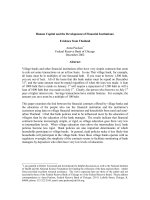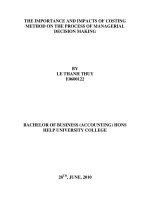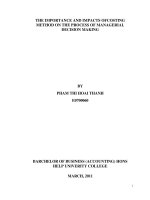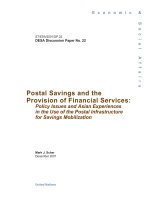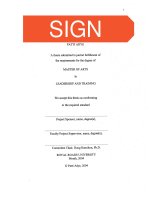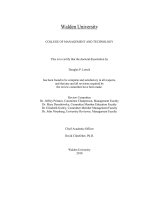Financial literacy and the limits of financial decision making
Bạn đang xem bản rút gọn của tài liệu. Xem và tải ngay bản đầy đủ của tài liệu tại đây (1.25 MB, 362 trang )
Financial Literacy and
the Limits of Financial
Decision-Making
Edited by
Tina Harrison
Financial Literacy and the Limits of Financial
Decision-Making
This page intentionally left blank
Financial Literacy and
the Limits of Financial
Decision-Making
Edited by
Tina Harrison
University of Edinburgh Business School, UK
Editor
Tina Harrison
University of Edinburgh
UK
ISBN 978-3-319-30885-2
ISBN 978-3-319-30886-9 (eBook)
DOI 10.1007/978-3-319-30886-9
© The Editor(s) (if applicable) and the Author(s) 2016
The author(s) has/have asserted their right(s) to be identified as the author(s)
of this work in accordance with the Copyright, Designs and Patents Act 1988.
This work is subject to copyright. All rights are solely and exclusively licensed
by the Publisher, whether the whole or part of the material is concerned,
specifically the rights of translation, reprinting, reuse of illustrations, recitation,
broadcasting, reproduction on microfilms or in any other physical way, and
transmission or information storage and retrieval, electronic adaptation,
computer software, or by similar or dissimilar methodology now known or
hereafter developed.
The use of general descriptive names, registered names, trademarks, service
marks, etc. in this publication does not imply, even in the absence of a specific
statement, that such names are exempt from the relevant protective laws and
regulations and therefore free for general use.
The publisher, the authors and the editors are safe to assume that the advice
and information in this book are believed to be true and accurate at the date
of publication.
Neither the publisher nor the authors or the editors give a warranty, express
or implied, with respect to the material contained herein or for any errors or
omissions that may have been made.
Printed on acid-free paper
This Palgrave Macmillan imprint is published by Springer Nature
The registered company is Springer International Publishing AG Switzerland
Contents
List of Figures and Tables
vii
Notes on Contributors
x
Introduction
Tina Harrison
1
1 Cognitive Drivers of Suboptimal Financial Decisions:
Implications for Financial Literacy Campaigns
Hooman Estelami
10
2 A Comprehensive Model of Information Search
and Processing Behaviour of Mutual Fund Investors
Sanjay Kumar Mishra and Manoj Kumar
26
3 The Information Search Process of Socially
Responsible Investors
Jonas Nilsson, Anna-Carin Nordvall and Sofia Isberg
57
4 Do Investors Show an Attentional Bias toward
Past Performance? An Eye-Tracking Experiment on
Visual Attention to Mutual Fund Disclosures in
Simplified Fund Prospectuses
Andreas Hüsser and Werner Wirth
5 The Role of Creative Strategy, Ad Disclosure and
Regulatory Focus in Investors’ Decision Making:
An Experimental Investigation
Taejun (David) Lee, TaiWoong Yun and Kwang Seok Han
6 Socialization and Processing Effects on Comprehension
of Credit Card Advertisement Disclosures
Alex Wang
7 Consumer Rationality/Irrationality and Financial
Literacy in the Credit Card Market: Implications
from an Integrative Review
Na Shen
8 Psycho-Social Factors Impacting Credit Acquisition and
Use by College Students
James W. Peltier, Nadia Pomirleanu, Michael Endres
and Ereni Markos
v
77
103
135
155
177
vi
Contents
9 Factors Affecting Investment Intentions: A Consumer
Behaviour Perspective
Kang Li Lim, Geoffrey N. Soutar and Julie A. Lee
201
10 Factors Influencing Investor Choice of Retirement Funds
Allan Lee, Yingzi Xu and Kenneth F. Hyde
224
11 The Customer Orientation of Financial Advisers
Diane Halstead, Michael A. Jones, Vance P. Lesseig
and Thomas I. Smythe
246
12 Gender Stereotyping in Financial Advisors’
Assessment of Customers
Inga-Lill Söderberg
260
13 Financial Literacy and Financial Literacy
Programmes in Australia
Andrew C. Worthington
281
14 Assessment of Behavioural Outcomes of Financial
Education Workshops on Financial Behaviour of the
Participants: An Experimental Study
Harsha Vijaykumar Jariwala and Mahendra S. Sharma
302
15 Fraud and Its PREY: Conceptualising Social Engineering
Tactics and Its Impact on Financial Literacy Outcomes
Jacqueline M. Drew and Cassandra Cross
325
Index
341
List of Figures and Tables
Figures
2.1
Proposed comprehensive model of information search
and processing behaviour of MF investors
30
2.2
Proposed model with measurement items
42
2.3
The structural equation model with standardized estimates
46
3.1
The theoretical model of the study
59
4.1
Overview of the treatment conditions
85
5.1
Creative strategy × regulatory focus → Attitude toward
financial product
117
5.2
Creative strategy × regulatory focus → Purchase intention
118
5.3
Ad disclosure × regulatory focus → Attitude toward
financial product
119
5.4
Ad disclosure × regulatory focus → Purchase intention
120
5.5
Creative strategy × ad disclosure × regulatory
focus → Attitude toward financial product.
(a) Ads without disclosures; (b) Ads with disclosures
123
Creative strategy × ad disclosure × regulatory
focus → Purchase intention. (a) Ads without disclosures;
(b) Ads with disclosures
124
5.6
5.A1 (a) Informational ad without ad disclosure;
(b) Informational ad with ad disclosure
133
5.A2 (a) Transformational ad without ad disclosure;
(b) Transformational ad with ad disclosure
134
7.1
Research framework on consumer behavior in the
credit card market
166
8.1
Proposed psycho-social credit card model
180
9.1
An investment intentions model
208
10.1
Codes and themes emerging from focus group meetings
232
10.2
Factors influencing KiwiSaver fund choice
234
15.1
PREY framework
332
vii
viii
List of Figures and Tables
Tables
2.1
Demographic profile of the study respondents (N = 268)
37
2.2
Dimensionality and reliability of subjective knowledge
(SK) construct (N = 268)
38
2.3
Dimensionality and reliability of PPR construct (N = 268)
39
2.4
Dimensionality and reliability of purchase decision
involvement (PDI) construct (N = 268)
40
2.5
Dimensionality and reliability of DIS construct (N = 268)
40
2.6
Dimensionality and reliability of DIP construct (N = 268)
41
2.7
Results of discriminant validity test
44
2.8
Means, standard deviations and intercorrelations
among study variables
45
2.9
Fit statistics for hypothesized model
47
3.1
The independent and dependent variables
used in the study
65
3.2
T-tests on the influence of the different types of
involvement and knowledge on the types of
information used by socially responsible investors
68
3.3
T-tests on the influence of the different types of
involvement and knowledge on the sources used
by socially responsible investors
69
T-tests on the influence of the different types of
involvement and knowledge on the amount of
information gathered prior to investing in SRI
profiled mutual funds
71
4.1
Between-subjects tests
90
4.2
Estimated marginal means (EMMEANS) and
standard errors (SE)
91
Indirect effects of past performance on purchase
intentions through mediators
93
3.4
4.3
5.1
Summary statistics and correlations among study variables
115
5.2
Moderated multiple regressions results
116
5.3
ANOVA results of the median split of regulatory focus
121
6.1
Multiple regression equation
143
List of Figures and Tables
ix
6.2
Multivariate tests
143
6.3
Tests of between-subjects effects
144
6.4
Means (standard deviations) of dependent measures
145
7.1
Statistics on the references
158
8.1
Review of the literature
181
8.2
Respondent profile
187
8.3
Factor loadings of survey items on six psychosocial
factors and coefficient α’s
189
8.4
Multivariate regression results: Number of credit cards
and total credit card debt
192
Review of hypotheses: Number of credit cards and
total credit card debt
193
9.1
The constructs’ measurement properties
211
9.2
The alternative structural model’s standardised
path coefficients
213
9.3
Direct, indirect and total effects of the alternative model
214
9.4
Standardised indirect and direct effects (probabilities)
216
9.A1
The constructs used in the study
223
11.1
Customer orientation scale items
251
11.2
Sample characteristics
253
11.3
Customer orientation by financial adviser demographics
254
11.4
Importance of fund factors and satisfaction with
performance by level of customer orientation
257
12.1
Dependent variables
268
12.2
Results of independent samples t-test
269
12.3
Results of two-way between-groups analyses of
variance (ANOVA)
271
8.5
12.A1 The chosen attitudinal statements from the
questionnaire
280
14.1
Respondents’ profile
311
14.2
Paired samples statistics
313
14.3
Paired samples statistics for financial behaviour
315
14.A1 Codebook for 22 financial behaviour statements
323
Notes on Contributors
Editors
Tina Harrison is Professor of Financial Services Marketing and
Consumption. She joined the University of Edinburgh in 1993.
Previously she was a doctoral researcher at the Financial Services
Research Centre, at UMIST, Manchester, where she conducted segmentation research funded by the Trustees Savings Bank. Her current
research interests are in the area of financial services marketing, specifically associated with consumer use and understanding of financial
services and the role of technology. She has led several large research
projects, including a three-year ESRC-funded project on the impact of
the Internet on the pensions industry as well as a range of industryfunded projects. Over the last two years she has led the ESRC-funded
Seminar Series Financial Services and Consumers: Issues and Challenges
in a Context of Change. Her research has been presented widely at conferences and in academic journals. She is co-editor of The Routledge
Companion to Financial Services Marketing, author of Financial Services
Marketing, and long-standing Editor-in-Chief of the Journal of Financial
Services Marketing.
Contributors
Cassandra Cross is a senior lecturer in the School of Justice, Queensland
University of Technology, Australia. She has expertise in online fraud
and victimisation. She has a unique blend of academic and applied experiences working as a senior policy officer and research analyst with the
Queensland Police Service prior to joining QUT in 2012. She has been
involved in academic research on victimisation and its policy formulation for eight years, and been recognised for her contributions through
being awarded a Donald Mackay Churchill Fellowship in 2011 and a
Vice Chancellor’s Performance Award for Research in 2015. With colleagues, she has been awarded two Criminology Research Grants, one
in 2013 to examine online fraud victimisation reporting and support
in Australia, and another in 2015 to explore identity theft restoration.
Jacqueline M. Drew is a senior lecturer in the School of Criminology
and Criminal Justice, Griffith University, Brisbane, Australia. She has
x
Notes on Contributors xi
worked as a practitioner and researcher across a number of Australian
police agencies and academic institutions. Her research interests include
white collar crime (particularly, investment fraud, corporate fraud,
and regulation) and leadership and performance management within
policing. She has published academic work on Ponzi schemes, financial
literacy, fraud curriculum, carbon fraud, third party partnerships and
human resource management in policing. She leads a large research
project in collaboration with the Fraud and Cyber Crime Group,
Queensland Police Service, studying operational police responses to
advance fee fraud victimisation.
Michael Endres holds a PhD in Psychology from Indiana University,
USA. After completing post-doctorate work at NeuBehavioral Research,
he is now a research statistician at the Hawaii Department of Health.
He has published in the Journal of Abnormal Behavior and Behavioral
Research.
Hooman Estelami is Professor of Marketing at the Gabelli School of
Business, Fordham University in New York, USA. He is the author of five
books: Marketing Financial Services; Marketing Turnarounds; The Routledge
Companion to Financial Services Marketing; Predictors of Victory and Injury
in Mixed Martial Arts Combat; and Frontiers of Distance Learning in Business
Education. He is the editor of the International Journal of Bank Marketing,
and previously served as the associate editor of the Journal of Product
and Brand Management. His areas of specialisation are financial services
marketing, pricing, customer service management, and distance education. He has received multiple awards for his teaching and research and
has advised a wide range of corporations on target marketing, pricing,
and service enhancement strategies. He received his PhD in marketing
from Columbia University, USA, and his MBA from McGill University,
Canada. His research has appeared in a wide range of journals including: International Journal of Research in Marketing, Journal of the Academy
of Marketing Science, Journal of Financial Services Marketing, Journal of
Retailing, Journal of Business Research, Journal of Service Research, Journal
of Product and Brand Management, Journal of Consumer Behaviour,
Journal of Promotion Management, Journal of Marketing Education, and
Marketing Education Review.
Diane Halstead is the Mary Harris Distinguished Professor of
Entrepreneurship at the University of Tennessee/Chattanooga, USA,
where she has taught courses in marketing strategy, services marketing,
small business and entrepreneurship, and more. She has also been a
faculty member at the University of Kentucky and Western Michigan
xii
Notes on Contributors
University, USA. She has served in marketing positions at several advertising and public relations agencies. She has also provided consulting
and corporate training services for TVA, UNUM, BC/BS of Tennessee,
DuPont, Ace Hardware, American Red Cross, and for over 60 small
businesses at the Chattanooga Business Incubator. She has published
in journals such as Journal of Business Research, Journal of the Academy
of Marketing Science, Journal of Advertising, Journal of Services Marketing,
Journal of Marketing Theory and Practice, and others. She holds her PhD
in marketing from Michigan State University and a BBA and MBA in
marketing from Western Michigan University.
Andreas Hüsser is a scientific assistant in the Department of Media
Psychology and Effects at the Institute of Mass Communication and
Media Research, University of Zurich, Switzerland. He holds a PhD from
the University of Zurich. His research focuses on media psychology and
media effects, advertising effects, and persuasion, especially in the field
of financial communication. His work has been published in Journal of
Consumer Affairs and Journal of Financial Services Marketing.
Kenneth F. Hyde is Associate Professor of Marketing at Auckland
University of Technology, New Zealand. His research interests include
tourist behaviour and decision making, and consumer behaviour in services. His work has been published in Annals of Tourism Research, Journal
of Business Research, Journal of Travel Research, Marketing Intelligence and
Planning, and Tourism Management.
Sofia Isberg is Senior Lecturer in Business Administration at Umeå
School of Business and Economics, Umeå University, Sweden. Her
research interests include corporate social responsibility from branding
and organisational perspectives.
Michael A. Jones is the Alan S. Lorberbaum Professor of Marketing at
the University of Tennessee at Chattanooga, USA. His research interests
include customer satisfaction, customer loyalty, and the marketing of
mutual funds. His research has appeared in Journal of Retailing, Journal of
Business Research, Journal of Service Research, Journal of Consumer Affairs,
Journal of Financial Planning, and Financial Services Review.
Manoj Kumar has a total work experience of over 16 years, is now the
Head of FLAME University’s Center for Case Development, and is also
Professor of Finance and Accounting at the FLAME School of Business,
FLAME University, Pune, India. Previously, he was Professor of Finance
and Accounting at IIM Lucknow and IIM Rohtak for around eight years.
Notes on Contributors xiii
He received his PhD from IIT Bombay, India. His earlier research papers
have been published in such peer-reviewed international journals as
Journal of Intellectual Capital, Journal of Financial Services Marketing,
Journal of Modern Accounting and Auditing, Vikalpa, Decision, Management
Review, Bombay Stock Exchange Review, Indian Management, and ICFAI
Journal of Applied Finance.
Allan Lee is Senior Lecturer in Journalism at Auckland University of
Technology, New Zealand. He teaches news writing and news editing,
data journalism, and financial reporting at both undergraduate and
postgraduate level. His research interests include production journalism, reporting on business and the economy, and retirement investing. He has edited Business Reporting: A New Zealand Guide to Financial
Journalism and has contributed chapters on business to other journalism
textbooks. Prior to joining the university, He has worked as a business and technology journalist for newspapers and magazines in the
UK, Australia, and New Zealand. His MPhil thesis explored financial
planning for retirement with an emphasis on New Zealand’s Kiwisaver
retirement scheme.
Julie A. Lee is Winthrop Professor in the Marketing discipline at the
University of Western Australia. Since completing her PhD in Business
Administration from the University of Illinois at Urbana Champaign,
USA, she has been a faculty member at several universities. She has
also consulted across a range of industries and organisations, including
acting as an expert witness in cases drawing on her expertise in crosscultural consumer behaviour and marketing research.
Taejun (David) Lee holds a PhD from the University of Tennessee,
Knoxville. He is Assistant Professor of Public Management at the Korea
Development Institute (KDI) School of Public Policy and Management
in South Korea. His research interests are in consumer well-being and
marketing regulations, public sector communication, and government
public relations. He has published or has work forthcoming in Journal of
Consumer Affairs, Journal of Consumer Policy, Journal of Services Marketing,
Journal of Behavioral Finance, International Journal of Advertising, Journal of
Financial Services Marketing, and International Journal of Bank Marketing,
among others as well as in several books and numerous conference
proceedings.
Vance P. Lesseig is Associate Professor of Finance at Texas State
University, USA. He received his PhD from the University of Oklahoma.
He has published numerous articles in the areas of investments,
xiv
Notes on Contributors
personal finance, corporate finance, and education. His recent work has
been primarily application based with emphasis on investor behaviour
and financial decision-making.
Kang Li Lim is working as a credit analyst in a leading bank. He completed his PhD and Master in Business Research from the University of
Western Australia. He obtained a First Class Honors in his undergraduate
degree in Banking and Finance from Nanyang Business School at the
Nanyang Technological University in Singapore. His research interests
include consumer behaviour, investment decision-making, and financial
services.
Ereni Markos is Assistant Professor of Marketing at Suffolk University
in Boston, MA, USA. She completed her PhD in Marketing at the
University of Massachusetts, Amherst, USA and holds a degree in
Integrated Marketing Communications from Emerson College in
Boston, USA. Her research interests include consumer privacy, digital marketing, retail atmospherics, and cross-cultural marketing. Her
research has been published in the Journal of Interactive Marketing,
Journal of Marketing Management, International Journal of Advertising, and
Journal of Marketing.
Sanjay Kumar Mishra is Assistant Professor of Finance in the School
of Business, Shri Mata Vaishno Devi University, Katra (J&K), India. He
has more than 10 years of teaching, research, training, and consulting
experience in the area of finance and banking. Much of his research
focuses on behavioural finance and entrepreneurial finance among others. Related to this work, his research papers/book chapters have been
published in national/international journals. He is a member of the
Editorial Board of Journal of Financial Services Marketing and a referee to
various reputed peer-reviewed national/international journals.
Jonas Nilsson is Senior Lecturer in marketing at the School of Business,
Economics and Law at the University of Gothenburg, Sweden. He has
focused much of his research on sustainability in the financial services
context; particularly on so-called socially responsible investment (SRI)
initiatives. He has written several papers and book chapters on how
consumers integrate their social, environmental, and ethical values into
their investment decisions.
Anna-Carin Nordvall completed her PhD in Psychology, examining
human decision-making and judgement. Now she is Associate Professor of
Business Administration (Marketing) at Umeå School of Business, Sweden.
Notes on Contributors xv
Her research area is decision-making, consumer behaviour, and development of quantitative methods in marketing.
James W. Peltier is Professor of Marketing and Director of the Institute
for Sales Excellence at the University of Wisconsin-Whitewater, USA.
His research interests include consumer psychology, decision-making,
public policy and societal marketing, interactive marketing, and
student-related issues. He has published in the European Journal of
Marketing, International Journal of Advertising, Journal of Public Policy and
Marketing, Consumer Affairs, Journal of Advertising Research, Industrial
Marketing Management, Journal of Interactive Marketing, and Journal of
Marketing Education, among others.
Nadia Pomirleanu is an associate professor in the Marketing and
International Business Department, University of Nevada, Las Vegas,
USA. Her primary research interests involve strategic issues in selling/
sales management and services operations/retailing. Her research has
been published in journals such as Journal of Retailing, Industrial Marketing
Management, Journal of Business Research, and Journal of Personal Selling and
Sales Management.
Kwang Seok Han holds a PhD from Kookmin University, Seoul, South
Korea. He is an associate professor in the Department of Advertising
and Public Relations at Namseoul University, Cheon-An, South Korea.
His research interests are in advertising effectiveness and memorybased advertising information. He has published in Journal of Global
Business Network, The Korean Journal of Advertising, The Korean Journal
of Advertising and Public Relations, Advertising Research, Journal of Digital
Interaction Design, Korean Journal of Journalism and Communication
Studies, and Journal of Outdoor Advertising Research, among others.
Mahendra S. Sharma is Vice-Chancellor at Ganpat University, India.
He is a professor and dean in the Faculty of Management Studies,
Ganpat University. He has a PhD in consumer buying behaviour in
the rural marketing domain. He is a recipient of the “Best Alumnus
Award” by Prestige Institute of Management & Research, Indore, and
the “Outstanding Contribution to the Field of Education” award by the
World Education Congress and Private Universities Forum 2014 and
several awards in research by leading organisations. He is an advisor
and member of advisory boards of several institutes in the country. He
possesses a rich experience in strategic management, rural marketing,
consumer behaviour, retail management, services marketing, and sales
and distribution management.
xvi
Notes on Contributors
Na Shen is an assistant professor in the Department of Business
Administration, Hong Kong Shue Yan University. She is also an honorary research associate in the Centre for Entrepreneurship, the Chinese
University of Hong Kong. Before entering the PhD programme in
the Department of Finance CUHK, she was a consultant for Deloitte.
In Shue Yan, she teaches courses in Business Research, Business Strategy,
Business Statistics, and Principles and Practice of Management. Her
research interests include business strategy, corporate finance, consumer finance, and financial economics. She has published papers in
Economic Modelling, Emerging Market Finance and Trade, and Journal of
Financial Services Marketing among others. She is involved in several
research projects, including one funded project on business succession
and another funded project on private entrepreneurs’ religious beliefs.
Thomas I. Smythe is Associate Professor of Business and Accounting
at Furman University in Greenville, South Carolina, USA. He continues to publish in the area of mutual fund advertising. His 2009 paper,
“Regulating Information Disclosure in Mutual Fund Advertising
in the United States: Will Consumers Use Cost Information?”
co-authored with Beth Pontari and Andrea Stanaland, published in
the Journal of Consumer Policy, is the subject of an interview and cited
in the Government Accounting Office study related to fund advertising
as part of the Dodd-Frank Act of 2010. His work has been cited in
or he has been quoted in the Wall Street Journal, Financial Times,
USA Today, Consumer Reports, Money Magazine, CNN Money, Chicago
Tribune, Bloomberg Radio, Associated Press, Miami Herald, as well as
others.
Inga-Lill Söderberg holds a PhD in Business Studies and is working
as a researcher at the Royal Institute of Technology, KTH, Sweden. Her
main research interest concerns professional human relationships with
a focus on the interface between buyers and sellers in the financial
system. This involves research on relationship marketing, consumer
financial literacy and risk perception, advisor training, as well as on
risk and product communication from financial advisors and the
institutions involved. Journals she has published in include Journal
of Financial Services Marketing, International Journal of Bank Marketing,
Journal of Socio-Economics, and International Journal of Housing Markets
and Analysis. She is also Head of the Centre for Banking and Finance
(CEFIN) the Royal Institute of Technology. CEFIN is an interdisciplinary
centre for research, education, and industry collaboration. Together
with partners within and outside the academy CEFIN conducts research
Notes on Contributors xvii
on financial services, financial markets and real estate, and on the
financing of entrepreneurship and innovation.
Geoffrey N. Soutar graduated from Cornell University, USA, and is
Professor and Nancy Keegan and Don Voelte Distinguished Scholar at
the University of Western Australia Business School. He is a Life Fellow of
the Australian and New Zealand Academy of Management, an Inaugural
Fellow of the Australian and New Zealand Marketing Academy, and a
Life Member of the Australian Market and Social Research Society. He
has published more than 200 papers in journals and books across a
range of marketing and management areas. In recent years he has had
particular interest in customer service, service quality and its impact
on organisational success. He is presently working on major projects
that are examining people’s personal values and the roles they play in
a variety of circumstances, including in the financial service sector, the
ways cooperative enterprises return value to members, and the nature of
innovation networks and the factors that influence their success.
Harsha Vijayakumar Jariwala is an assistant professor at V. M. Patel
Institute of Management, Ganpat University, India. She did her PhD on
financial literacy and investment decision. Her doctoral research was
awarded “The Best Ph.D. Thesis in Management” at the Twelfth Best
Ph.D. Thesis contest organised by Prestige Institute of Management &
Research, Indore. Her doctoral research work also received the “Best
Research Paper Award” in the “Advanced Stage Category” at the First
Doctoral Colloquium organised by Ganpat University, India. She is a
certified trainer for financial education by the National Institute of
Securities Markets and a Financial Education Resource Person for the
Securities and Exchange Board of India for promoting financial literacy
in the western region of India. Her areas of interest include strategic
management, financial literacy, financial education, personal financial
planning, and Indian financial systems.
Alex Wang’s research has focused on issues related to consumer information processing, integrated marketing communications, Internet
advertising, and corporate social responsibility (CSR). His research has
appeared in journals such as the Journal of Advertising Research, Journal
of Public Relations Research, Journal of Financial Services Marketing, and
Corporate Communications: An International Journal. He is the author
of two books and has won several awards for his research, and has
industry experience in advertising, electronic publishing, and public
relations.
xviii
Notes on Contributors
Werner Wirth holds a PhD from the University of Munich. He is
Full Professor of Empirical Communication Research and Head of
the Department of Media Psychology and Effects at the Institute of
Mass Communication and Media Research, University of Zurich,
Switzerland. His research focuses on media psychology and media
effects, persuasion, emotions, and empirical methods in the field of
political communication, mobile communication, online communication, and financial communication. His work has been published in
Journal of Advertising, Media Psychology, Journal of Communication, Mass
Communication and Society, and Journalism and Mass Communication
Quarterly, among others.
Andrew C. Worthington is Professor of Finance at Griffith University
in Brisbane, Australia. His research and consulting activities, for which
he has received numerous research grants and awards, include household financial decision-making, risk attitudes, and debt and asset portfolios, with relevant studies published in the Journal of Consumer Policy,
Journal of Financial Services Marketing, Financial Services Review, Journal of
Family and Economic Issues, Studies in Economics and Finance, International
Journal of Housing Markets and Analysis, Review of Economics of the
Household, International Journal of Consumer Studies, Financial Counselling
and Planning Journal, and Housing Theory and Society.
Yingzi Xu is Senior Lecturer in Marketing at the Auckland University
of Technology, New Zealand. Her research interests include customer
complaining behaviour, service recovery, and online customer-tocustomer interactions in service research. She has published articles
in international journals such as Journal of Business Research, Journal of
Service Management, Marketing Intelligence and Planning, Managing Service
Quality, and the Service Industries Journal.
TaiWoong Yun holds a PhD from the University of Texas at Austin.
He is Associate Professor of Marketing in the College of Business
Administration and Associate Dean for Academic Affairs at Incheon
National University in South Korea. His research interests are consumer
psychology, consumer welfare, persuasion, advertising message effectiveness, and statistical methods, among others. His research has been
published in Journal of Consumer Affairs, Journal of Services Marketing, and
Journal of Financial Services Marketing, among others.
Introduction
Tina Harrison
The welfare of consumers and nations is heavily impacted by financial
decisions. Yet, due to a variety of factors, consumers are often poorly
informed and susceptible to making poor decisions that can have
significant personal as well as societal consequences. The recent global
financial crisis has served to highlight consumers’ deficiencies in
financial literacy and the need to enhance it.
The terms financial literacy, financial knowledge, and financial capacity
are often used interchangeably. Financial literacy is defined as comprising two key elements: how well an individual can understand financial
information and how well an individual can use financial information to manage his or her personal finances through both short-term
decision-making and long-term financial planning (Huston, 2010;
Remund, 2010). Hence, financial literacy assumes both knowledge and
capacity and can be viewed as a finance-specific form of human capital (Fernandes et al., 2014). Recently, the term financial capability has
emerged emphasising a shift in importance from financial knowledge
and understanding to ability to manage personal finances.
Financial literacy is a global issue. In both well-developed and developing nations financial illiteracy is widespread (Atkinson and Messy,
2013; Lusardi and Mitchell, 2013). The contexts individuals face vary
both across and within nations. For some, processes of de-regulation,
pension reforms, and increased product complexity have placed greater
responsibility on individuals to better understand financial products, to
navigate financial landscapes and generally take increased responsibility for their own financial decisions and welfare. For others, financial
literacy serves as a more fundamental means of achieving inclusion in
mainstream financial markets and protection from vulnerability and
abuse.
1
2
Tina Harrison
International comparative research notes that financial illiteracy is
more severe among key demographic groups (Lusardi and Mitchell,
2011a), including low-income households, ethnic minorities, and the
less educated in general. Persistent international differences have also
been found according to gender; in most cases women are found to be
less financially knowledgeable than men. Age patterns are also notable.
Lusardi and Mitchell (2011a) observe that financial knowledge follows
an inverted U-shaped curve: the lowest financial knowledge is found
among the younger and older ages peaking among those in middle age,
possibly reflecting patterns of experience and use of financial products
throughout the life course.
The case for financial literacy is well made in research evidence.
Consumers who are better informed and educated about financial matters have been shown to make better financial decisions. Individuals
possessing greater numeracy and financial literacy are more likely
to participate in financial markets (Yoong, 2011) and are more likely to
plan for retirement and accumulate more wealth (Lusardi and Mitchell,
2011b). By contrast, individuals and households with low levels of
financial literacy are less likely to plan for retirement, are more likely to
have poor borrowing behaviour, are more likely to incur higher fees and
use higher cost methods of borrowing (Lusardi and Tufano, 2009), are
more likely to default on mortgage payments (Gerardi et al., 2010), and
are at greater susceptibility to fraud and abuse.
A key challenge is how to increase effective levels of financial literacy in order to achieve better capability in financial management.
Governments and policymakers have embraced financial education
programmes as a means of addressing financial literacy. The OECD
(2015) observes that almost 60 counties in 2015 were engaged in implementing national strategies on financial education, compared with just
a handful in 2009.
Despite the international attention to financial education, research is
inconclusive about the impact of such interventions on financial outcomes (Gerardi et al., 2010) and reveals a complex relationship between
financial literacy, experience, and capability (Devlin, 2011). A metaanalysis of over 200 studies carried out in the United States (Fernandes
et al., 2014) observes that whilst financial education programmes did
improve longer term financial behaviour, the impact was negligible and
the effect decreased over time. However, the study highlights a role for
‘just in time’ financial education. Clearly a one-size-fits-all approach
is unlikely to be effective. Financial education is not a value-free curriculum and should take account of the social context in which it is
Introduction
3
delivered (Brimble and Blue, 2013). Hence, there is a need to better
understand the complex relationships between contexts, interventions,
and outcomes.
Set against this context, this book draws together a range of studies
from the Journal of Financial Services Marketing that shed light on financial literacy and the limits of financial decision-making. The articles
in this collection take account of the following factors that exert an
impact on financial literacy and effective financial decision-making:
(1) individual-level cognitive and social factors affecting understanding
of financial matters and financial capability; (2) firm-level factors relating particularly to the marketing mechanisms that support, or inhibit,
effective financial decisions and choices, such as advertising and the
behaviour of financial experts or advisers; and (3) macro-level factors
such as national financial education programmes and regulatory or
structural processes aimed at supporting and protecting consumers.
The first three articles demonstrate the limits of consumers in making
rational decisions and the tendency to oversimplify decision criteria.
Hooman Estelami (Chapter 1) demonstrates that knowledge of financial matters is necessary but not sufficient on its own to ensure that
individuals are able to make rational financial decisions. Drawing on
empirical evidence from behavioural science and cognitive psychology,
Estelami discusses how suboptimal decision styles often result from the
basic and inherent limitations hard-wired into the human cognitive
and neurological systems. The article profiles five decision patterns
which account for a range of suboptimal financial decisions by consumers and highlights the impact of each decision style on decision-making
behaviour. A possible explanation for the lack of apparent effectiveness
of financial literacy programmes may be the failure to acknowledge or
counter these forces.
Sanjay Kumar Mishra and Manoj Kumar (Chapter 2) demonstrate the
impact of subjective knowledge (i.e. perceived knowledge as opposed to
actual objective knowledge) on information searching and involvement
in the purchase decision process of mutual funds. They find that investors who perceive themselves as highly knowledgeable perceive the
purchase of mutual funds to be less risky, and are motivated to actively
engage in investment decisions, whereas investors who perceive themselves as less knowledgeable perceive the purchase of mutual funds as
more risky, and are motivated to remain passive during investment
decisions. High perceived knowledge can lead to overconfidence which
has been shown in other studies to lead to self-regulation failure and
greater risk-taking (Chu et al., 2012).
4
Tina Harrison
In the context of socially responsible investing decisions, Jonas
Nilsson, Anna-Carin Nordvall and Sofia Isberg (Chapter 3) reveal how
use of information sources depends on consumer knowledge of the
information. While involved and knowledgeable consumers generally
searched for more information than less involved and knowledgeable
consumers, different types of involvement and perceived knowledge
were associated with different search behaviours. More financially
involved and knowledgeable investors tended to exhibit information
search processes that focused on financial aspects of the mutual fund,
whereas investors who were more involved and knowledgeable about
social, environmental, and ethical issues searched more for such information. The findings of Nilsson et al. and Mishra and Kumar suggest
that investors are drawn to search for and use information that they
are most likely to understand (and therefore can process), rather than
attempt to fill knowledge gaps.
The next three articles (Chapter 4–6) highlight the ways in which
advertising can influence consumers’ information processing and effective decision-making through the use of ad disclosures (disclaimers).
The use of ad disclosures is assumed to enhance the use of advertising as
an information source by serving to reduce the information-processing
burden, highlighting salient information, and warning of potential
risks, thus leading to more informed consumer choices. However, the
true effects of ad disclosures are largely untested. Whilst ad disclosures
are intended to enhance information provision and aid information
processing, they may potentially lead to unintended consequences.
A key informational cue often communicated to investors in advertising is past performance. However, past performance is generally
understood to be a poor predictor of future returns, and firms must
provide such disclaimers in their promotional material to inform
potential investors. Using an eye tracking experiment, Andreas Hüsser
and Werner Wirth (Chapter 4) demonstrate that disclaimers relating to
past performance are actually ineffective. Investors seem to believe in
the persistence of past performance and are prone to be drawn to it as
an informational cue, thus potentially leading to suboptimal decisions.
In a more nuanced study of the impact of ad disclosures, Taejun
(David) Lee, TaiWoong Yun and Kwang Seok Han (Chapter 5) show
that the effect of ad disclosures depends on certain psychological
predispositions. Distinguishing between promotion-focused investors
(individuals who are motivated to achieve positive outcomes) and
prevention-focused investors (individuals who are motivated to avoid
negative outcomes), they find that investors with a promotion focus
Introduction
5
evaluated advertisements without disclosures more positively, whereas
investors with a prevention focus preferred advertisements with disclosures. Hence, psychological predisposition can serve as a filter to process
advertising claims and can lead to selective information use.
In the final study of ad disclosures, Alex Wang (Chapter 6) takes into
account the influence of socialisation (prior experience of use) and processing (message involvement and motivation to process disclosures) on
college students’ comprehension of disclosures in credit card advertisements. He finds that whilst processing may enhance understanding of
the disclosures, socialisation may have an inverse and negative effect.
The study also reveals that, despite having more experience of credit
cards, female students may be more susceptible to ignoring disclosures.
This suggests that experience (and possibly habit formation) may override the effects of potentially useful disclosures.
A possible explanation may be found in the interplay between
rationality and irrationality, as discussed in the next article. Na Shen
(Chapter 7) provides a detailed review of the literature to understand
the extent to which credit card consumers make rational decisions, and
the impact of financial literacy, cognitive ability, financial knowledge
and financial education on credit card decisions and behaviour. The
review suggests that consumer rationality and irrationality are equally
possible in relation to consumer credit card decisions and behaviour.
Moreover, irrationality creates the potential, if not managed appropriately, for credit card issuers to exploit the limitations of consumers,
a situation that can be improved by financial literacy. James Peltier,
Nadia Pomirleanu, Michael Endres and Ereni Markos (Chapter 8) take
account of a range of psycho-social variables that impact the acquisition of credit cards by college students and credit card debt. They show
that compulsivity, impulsivity, financial anxiety, social status and external locus of control lead to more credit card usage, whereas parental
involvement leads to lower balances.
Financial literacy may impact decisions on borrowing and investing differently. As a comparison the following two articles specifically
explore the factors influencing investment decisions and behaviours.
Kang Li Lim, Geoffrey Soutar and Julie Lee (Chapter 9) find that product knowledge and product involvement have the greatest impact on
intentions to invest in the stock market. Perceived risk was found to
have a mediating effect on intentions to invest, whereas perceived
uncertainty did not, emphasising the importance of viewing risk
and uncertainty as separate constructs. Allan Lee, Yingzi Yu and
Kenneth F. Hyde (Chapter 10) identify the five key factors influencing
6
Tina Harrison
consumer choice of retirement investment fund in the context of an
auto-enrolment retirement regime: attitude to financial risk; perceived
time to retirement; advice from family, friends and colleagues; information from providers and the media; and knowledge of investing. Despite
the importance of retirement saving, the study suggests that choice of
retirement investment fund is a low-effort decision for many people,
and there is a tendency to opt for the default fund. These findings are
consistent with other research that suggests consumers engage in more
extended information search for simple financial products than for
complex financial products.
Most studies of financial literacy are largely based on the assumption
that individuals make their own independent financial decisions. In
many cases, though, individuals delegate those decisions to a financial
expert – typically a financial adviser. Decision delegation can alleviate
the stress associated with making a decision, minimising the need for
mental effort (Broniarczyk and Griffin, 2014). Financial advisers use
their professional skills to reduce uncertainty, to advise of the risks
and make expert-supported recommendations. Expert financial advice,
thus serves as a substitute for lack of consumer financial knowledge.
Consumers who delegate a financial decision to a financial expert
usually do so in the expectation that it will lead to a better financial
outcome. However, despite expert knowledge, financial advisers are
not immune to the inherent cognitive limitations and biases that affect
individuals.
The next two articles specifically highlight potential gender bias or
gender stereotyping in financial adviser behaviour. A number of studies
have separately confirmed gender-related differences in risk-aversion
behaviour and investment behaviour (Charness and Gneezy, 2010).
The studies generally show that women are more risk averse than men,
and that men exhibit overconfident behaviour. The literature also notes
that advisors have a tendency to tailor their approach according to
customer gender. Diane Halstead, Michael A Jones, Vance P Lesseig
and Thomas I Smythe (Chapter 11) find that customer orientation of
financial advisers varies across gender, income, and company type.
Female advisers have significantly higher customer orientation levels
than male advisers. Advisers earning the least amount had lower levels
of customer orientation and advisers working for brokerage and security
firms reported slightly higher customer orientation than advisers working for banks or insurance companies.
Inga-Lill Söderberg’s research (Chapter 12) finds evidence that advisers assess their customers differently according to risk tolerance and


